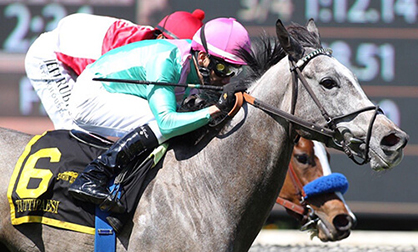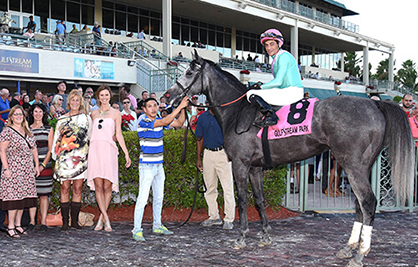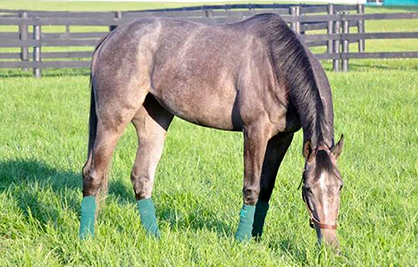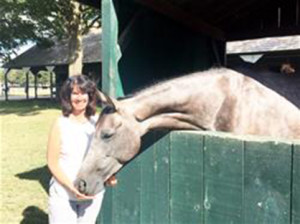Return From Potomac Horse Fever Diagnosis to the Winner’s Circle
By: Louisa Shepard
Tutti is the first girl in the Ladies’ club. She is also now a champion.
A striking dark grey Thoroughbred imported from Italy, Tuttipaesi is owned by Valor Ladies LLC, a partnership of women who invest in racehorses. Tutti, as she is affectionately called, is the first of the Ladies’ four fillies.
Squeezing through a tiny gap between horses in the stretch, Tutti came in first over the wire in the $200,000 Grade II Santa Ana Stakes in Santa Anita. The March race was the six-year-old mare’s first graded stakes win after stringing together a nice fall and winter campaign that included victories in the $75,000 Churchill Distaff Turf Mile Stakes and $100,000 South Beach Stakes.
Watching the race in an off-track betting location in Allentown was Lynne Cassimeris, a professor of cell biology at Lehigh University, and one of Tutti’s co-owners.
 “As they were coming around the turn, I started screaming to her to “Find room!” and “Go! Go! Go!” and I was jumping around after she won,” she said, recalling the moment. “Then my phone started ringing and ringing and ringing because everyone was so excited.”
“As they were coming around the turn, I started screaming to her to “Find room!” and “Go! Go! Go!” and I was jumping around after she won,” she said, recalling the moment. “Then my phone started ringing and ringing and ringing because everyone was so excited.”
The impressive win was a surprise: Tutti had come back after 18 months of rest to recover from a life-threatening illness that landed her in the isolation wing at Penn Vet’s New Bolton Center.
She Wasn’t Quite Right
The top filly in Italy in 2012, she was imported as the first Valor Ladies’ racehorse. After coming in second in a Grade I race at Keeneland, Tutti suffered a hairline condylar fracture of her left foreleg in May 2013. Following treatment at New Bolton Center, she went to Grattan Farm in Oxford, PA, managed by Fenella O’Flynn.
While at the farm during her layoff, Tutti came down with an illness. Her primary veterinarians thought it could be gas colic, said Megan Jones, founder of Valor Ladies, and Vice President of Team Valor International of Lexington.
“I was in Saratoga and Fenella called me back and said she knew something just wasn’t right with Tutti,” Jones said. “We sent her to New Bolton.”
Since she had a fever upon arrival, Tutti was placed in the isolation wing of New Bolton Center’s Moran Critical Care Center.
“It turned out that she had Potomac Horse Fever, which is a pretty common disease in this area. It is sometimes fatal if not caught and treated appropriately,” said Dr. Rose Nolen-Walston, Associate Professor of Internal Medicine. “It’s a scary disease. As soon as we suspect it, we treat it, even before the test results come back.”
 Symptoms are high fever, diarrhea, and often laminitis, which can be severe and hit early in the course of the disease. Potomac Horse Fever is caused by a bacterium that undergoes a lifecycle that involves freshwater snails, a worm that infects the snails, and one of several forms of flying insects. Horses are infected by accidentally eating tiny mayflies or caddis flies that settle on their hay and feed.
Symptoms are high fever, diarrhea, and often laminitis, which can be severe and hit early in the course of the disease. Potomac Horse Fever is caused by a bacterium that undergoes a lifecycle that involves freshwater snails, a worm that infects the snails, and one of several forms of flying insects. Horses are infected by accidentally eating tiny mayflies or caddis flies that settle on their hay and feed.
Treatment includes intravenous antibiotics (oxytetracycline) and low-dose anti-inflammatories. In addition, IV fluids help replace electrolytes, and ice boots reduce the chance of laminitis.
Even after symptoms of Potomac Horse Fever had resolved, Tutti’s blood protein levels were still dangerously low, Nolen-Walston said. An ultrasound examination revealed right dorsal colitis, the thickening and inflammation of a section of intestine.
Nolen-Walston concluded that Tutti had a reaction to NSAIDS—nonsteroidal anti-inflammatory drugs—which are in the same class as ibuprofen and aspirin for humans. In the horse world, commonly used NSAIDS are flunixin meglumine (Banamine) or phenylbutazone (“bute”).
“Even though she hadn’t had high doses of NSAIDS, she was affected,” Nolen-Walston said. “It is difficult to predict.” In some horses, the colon never heals completely, causing persistent protein losses through the damaged intestine, or scar tissue causes a narrowing of the intestine that can predispose the horse to colic, Nolen-Walston said.
Tutti responded well to treatment, and after five days was cleared for discharge. “Rose was fantastic,” Jones said. “She did a great job and kept us up-to-date the whole time.”
Tutti went home with orders for a low-bulk diet; supplemental corn oil and psyllium (like Metamucil), which provide nutrients for intestinal cells; and misoprostol, a medication that improves blood flow to intestines.
And one more important recommendation:
“No ‘bute’ or Banamine, forever,” Nolen-Walston said. “The biggest question was whether she would bounce back from disease to be a successful race horse, and could she be successful as a racehorse drug-free?”
Tutti’s Future
Tutti went back into training under Bill Mott in the fall of 2014, while spending some time with Bruce Jackson at Fair Hill in the summer of 2015.
“She was really rusty. It took awhile to get her back to where she was before,” Jones said. “Bill and Bruce did a fantastic job with her and gave her all the time that she needed. We were very careful with her diet early on, and she still doesn’t receive any NSAIDS.”
Tutti had been steadily improving leading up to the Santa Ana Stakes win. “Before she rounded back to form last summer, it was anybody’s guess if she would be able to come back,” Jones continued. “She always tries very hard, but no one could say if she could return to previous form.”
The win at Santa Ana answered that question. “It’s amazing what she’s done, and without any NSAIDS,” Jones said. “She’s a very charismatic filly.”
The Valor Ladies – ranging in age from 9 to 100 years old – are proud of her, as well. One-quarter of the profits from each Valor Ladies’ horse goes to charity. Tutti’s goes to breast cancer research.
A core group of Ladies travels to races and other events together and have become good friends.
“They’ve been patient and supportive, and have never lost their enthusiasm,” Jones said. “Even while she was on layoff, they came out to see her at the farm.”
Cassimeris is one of those regular visitors, and just saw Tutti on Friday. She took a selfie in the rain and sent it to her co-owners. She stops by Fair Hill in the morning before coming to New Bolton Center, where she collaborates on laminitis research with Dr. Hannah Galantino-Homer in New Bolton Center’s Laminitis Laboratory.
The plan for Tutti is to continue to race her this year, and then breed her to Animal Kingdom next year, Jones said.
“We are very excited about our potential foals,” Cassimeris said. “And I’m really looking forward to summer and fall and a couple of East Coast races.”












